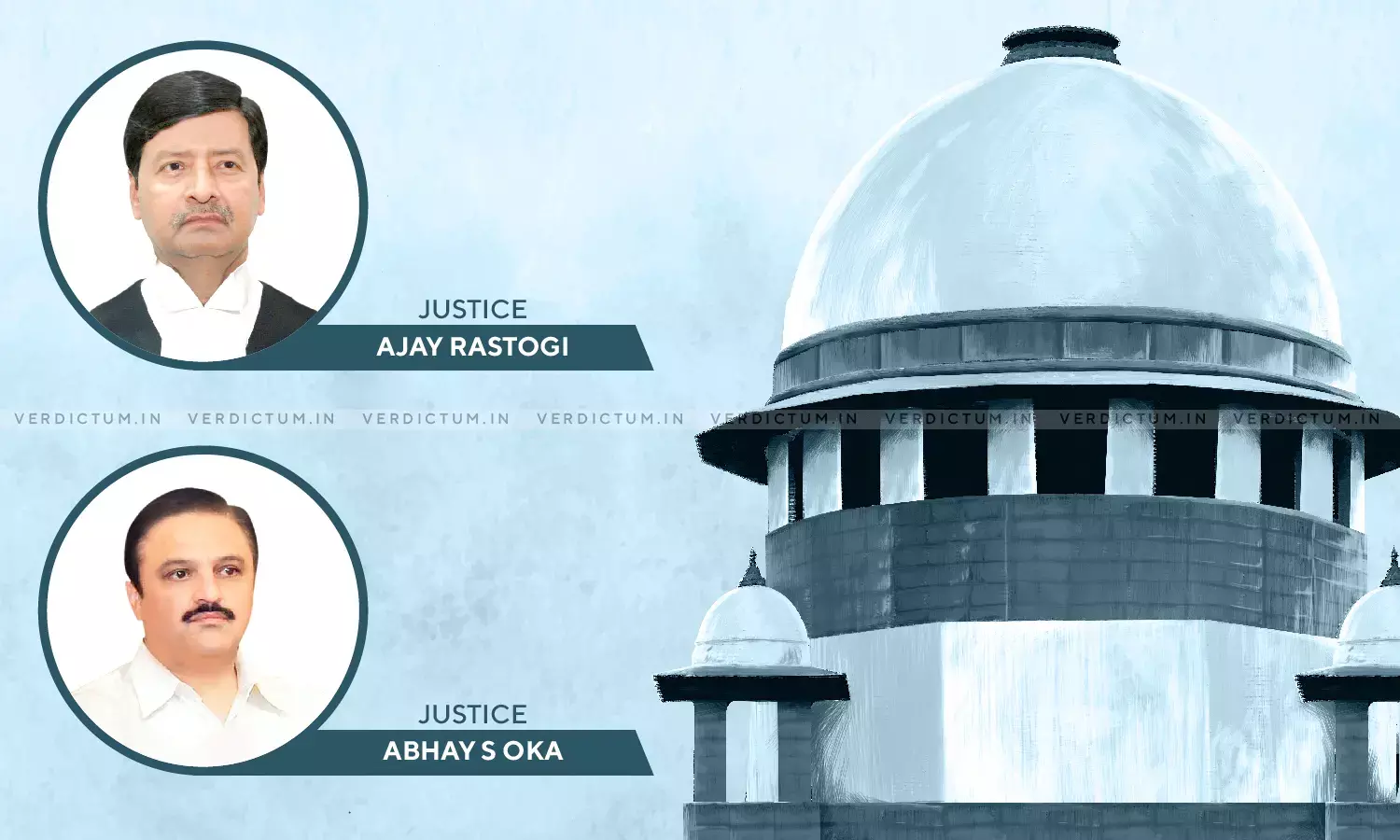All Ingredients Of "Thirdly" In Section 300 Of IPC Established: SC Reverses Judgment Reducing Conviction From Section 302 To 304 IPC

A two-judge Bench of Justice Ajay Rastogi and Justice Abhay S. Oka has held that once the Prosecution establishes the existence of the three ingredients forming part of "thirdly" in Section 300 of IPC, it is irrelevant whether there was an intention on the part of the accused to cause death.
Senior Advocate Mr. Manish Singhvi appeared for the State of Rajasthan, Advocate Mr. Manish K. Bishnoi appeared for the Appellant-Complainant and Advocate Gp. Capt. Karan Singh Bhati appeared for the Respondent-Accused during the proceedings before the Court.
In this case, the Sessions Court had convicted the Respondents 1 to 5 for all offences punishable under Sections 147, 364, 302/149, 201, and 323/149 of IPC. The accused were sentenced to life imprisonment under Section 302 read with Section 149 IPC. For other offences, lesser punishments were imposed.
Aggrieved, the Respondents-Accused had preferred an appeal before the Rajasthan High Court which had maintained the conviction of the accused of the offence punishable under Sections 147, 364, 201, and 329/149 of IPC. However, regarding the conviction under Section 302 IPC, it was brought down to Section 304 Part II IPC. They were sentenced to undergo rigorous imprisonment for 8 years.
Aggrieved, the Appellant who is also a brother of the injured victim (PW1) filed an appeal before the Supreme Court challenging the order of the High Court. It was alleged against the accused that he committed the murder of Balveer Singh (Deceased) and also injured Vijay Singh (PW1).
The Appellant contended before the Supreme Court that the Respondent-Accused had caused bodily injuries on the vital body parts of the deceased, which led to excessive bleeding and shock which was the cause of his death. It was further argued that none of the exceptions to Section 300 IPC were applicable, however, "thirdly" in Section 300 IPC was applicable.
While the Respondent, though admitted participation in the crime, contended that there was no intention on the part of the accused to kill the deceased which was clear from the fact that the former took the latter to a doctor.
The Apex Court while examining the testimony of the doctor (PW3) noted that the cause of death of the deceased was the infliction of injuries on the vital parts like lungs and liver which resulted in excessive bleeding and shock. In this context, the Court held –
"Though, the PW1 has not specifically stated that the injuries on the deceased were inflicted by using iron rod or stick, there is no dispute that the accused have caused the injuries."
The next issue which was dealt with by the Court was whether the offence of culpable homicide not amounting to murder was made out.
The Court analyzed the "thirdly" under Section 300 of IPC that relates to Murder, which is as follows: –
"Thirdly —If it is done with the intention of causing bodily injury to any person and the bodily injury intended to be inflicted is sufficient in the ordinary course of nature to cause death."
The Bench observed that in the case, none of the exceptions to Section 300 IPC were applicable.
The Court additionally noted that the issue which was required to be dealt with was whether the case will be covered by "thirdly" in Section 300. In this context, the Court observed –
"Therefore, it is impossible to say that the injuries on the chest which resulted into fracture of 5 ribs and rupture of right lung were accidental or un-intentional. Therefore, even the third element was established."
"From the evidence of PW3 Dr. Jaspal Badappa, it can be gathered that the injuries on the vital parts like right lung and liver which resulted into bleeding and shock were sufficient to cause the death in the ordinary cause of nature," the Bench opined.
The Court while relying upon the precedent of Virsa Singh v. The State of Punjab, added, "It does not matter that there was no intention even to cause the injury of a kind that is sufficient to cause death in ordinary course of nature. Even the knowledge that an act of that kind is likely to cause 18 death is not necessary to attract "thirdly". Hence, it follows that clause "thirdly" of Section 300 will apply in this case."
"We are constrained to observe that the High Court adopted an easy method of accepting the only contention canvassed that the offence made out was culpable homicide not amounting to murder. As noticed earlier, the High Court ignored that there were injuries on the vital parts of the body of the deceased. The High Court did not notice that all the elements of "thirdly" in Section 300 were established," the Bench held.
The Court further opined that the High Court committed a gross error by applying Section 304 Part II IPC.
In the light of these observations, the Court set aside the impugned judgment of the High Court and restored the order of the Sessions Court of convicting the Appellant under Section 302/149 IPC. The Court directed the accused to surrender before the Trial Court and undergo the remaining period of the sentence in terms of the judgment of the Trial Court.
Click here to read/download the Judgment

